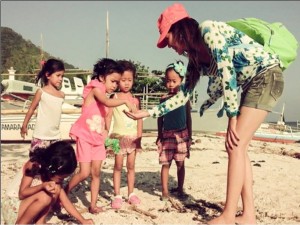 Supertyphoon “Yolanda” destroyed houses, ravaged livelihoods and shattered the lives of hundreds of thousands of victims.
Supertyphoon “Yolanda” destroyed houses, ravaged livelihoods and shattered the lives of hundreds of thousands of victims.
But for some, like the Obligar family of Carles town in Iloilo, the calamity also opened doors and brought opportunities.
Amalia and Niel have been married for 25 years and blessed with seven children. But for the past 17 years, they have struggled to take care of Melinda, their fourth child. Melinda was born normal and healthy until she reached eight months old when her parents noticed a delay in her motor development or the ability to control her body movements.
She could not talk, walk and rarely cries. She also could not perform other movements and skills without her family’s assistance and supervision. Even though bothered by her condition, her family remained optimistic, acknowledged her as a special child and tried their best to provide for her needs.
But it has not been easy as they have meager means to meet even their basic needs. The couple works as sugarcane laborers and have six other children to attend to.
They explored all possible solutions and cure for Melinda, even bringing her to quack doctors and medical missions in various places to find any solution for her condition. But for 17 years, they found no answers.
When “Yolanda” struck two years ago on Nov. 8, 2013, Carles was among the areas along the path of the supertyphoon. The Obligars were among the families worst hit by the calamity with their house destroyed by strong winds.
As part of a program of the Department of Social Welfare and Development (DSWD) field office in Western Visayas in partnership with the United Nations Children’s Fund (UNICEF), a social welfare officer (as part of the human resource augmentation support from DSWD Region VI) was assigned to the MSWD office of Carles early in 2015.
This was aimed to assist the strengthening of the municipality’s social welfare system with focus on identifying child protection concerns affecting children and adolescents and in the rehabilitation and recovery efforts.
One of the expected outputs of the program is to identify unaccompanied and separated children including children at risk as a result of typhoon Yolanda and to facilitate family reunification and to promote Alternative Family Care. Melinda’s condition was identified in the process.
With the help of social workers from the DSWD, Melinda’s condition was later determined by Dr. Ronald Betita of the Rural Health Unit (RHU) as cerebral palsy. She was also diagnosed as suffering from severe malnutrition.
Under the UNICEF-DSWD program, cash assistance amounting to P10, 000.00 was provided to Melinda on August 19, 2015. This was used to purchase a wheelchair, diapers, medicines and milk to help her and her family deal with her condition.
With the help of the wheelchair, Melinda is now able to attend family gatherings and roam around the community. She has also gained weight.
“Thank you very much sa help. Maayo kay paagi sa inyo nabuligan gid kami sa bata namon sasulod sa 17 years nga paghulat kag pag kadto-kadto kung diin para matagaan ka wheelchair ang anak namon. Madamo gid nga salamat,” her parents said./dswd6/ Unnie Dequilla
